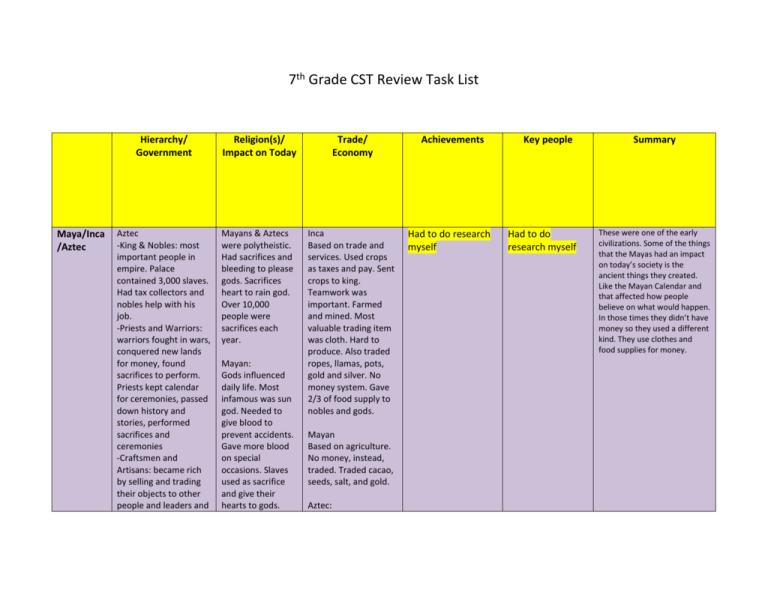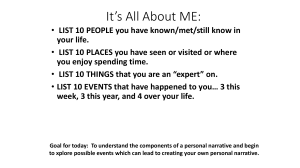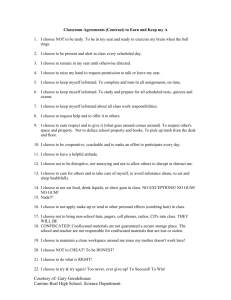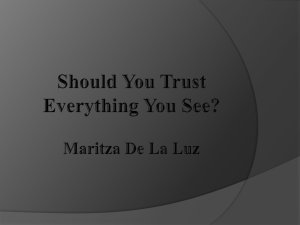7th grade CST Task List Selby
advertisement

7th Grade CST Review Task List Maya/Inca /Aztec Hierarchy/ Government Religion(s)/ Impact on Today Trade/ Economy Aztec -King & Nobles: most important people in empire. Palace contained 3,000 slaves. Had tax collectors and nobles help with his job. -Priests and Warriors: warriors fought in wars, conquered new lands for money, found sacrifices to perform. Priests kept calendar for ceremonies, passed down history and stories, performed sacrifices and ceremonies -Craftsmen and Artisans: became rich by selling and trading their objects to other people and leaders and Mayans & Aztecs were polytheistic. Had sacrifices and bleeding to please gods. Sacrifices heart to rain god. Over 10,000 people were sacrifices each year. Inca Based on trade and services. Used crops as taxes and pay. Sent crops to king. Teamwork was important. Farmed and mined. Most valuable trading item was cloth. Hard to produce. Also traded ropes, llamas, pots, gold and silver. No money system. Gave 2/3 of food supply to nobles and gods. Mayan: Gods influenced daily life. Most infamous was sun god. Needed to give blood to prevent accidents. Gave more blood on special occasions. Slaves used as sacrifice and give their hearts to gods. Mayan Based on agriculture. No money, instead, traded. Traded cacao, seeds, salt, and gold. Aztec: Achievements Had to do research myself Key people Had to do research myself Summary These were one of the early civilizations. Some of the things that the Mayas had an impact on today’s society is the ancient things they created. Like the Mayan Calendar and that affected how people believe on what would happen. In those times they didn’t have money so they used a different kind. They use clothes and food supplies for money. priests. -Farmers and Slaves: Most citizens were farmers. Lived in mud and stick houses. Paid rough taxes. Prime contestant for sacrifices Maya -Higher class: priests (led and helped in religious ceremonies. Used math and astrology). Merchants (directed trade and supplies between cities). Warriors (wore elaborate clothing to battle) -Lower class: farmers (served in army and gave crops to government. Worked on temples and construction projects) -Leader: lead religious ceremonies, military, and wore fancy clothes from gold. Considered a god. Inca -Higher: run empire. Owned servants. Had no taxes. Higher class women had duties on other women. Believed in underworld and godly place. Everyone had animal companion. Kings had jaguars. Inca: Never forces conquered people to worship their religion. Have ceremonies for sun god. Try to tie the sun down to keep it from disappearing in winter. Kings related to sun god, so they can’t die. Based on agriculture and trade. Used all land available. Used Chi Nampa farming system. No money. Traded cacao beans (most important item), cotton, clothing items (from feather, and jaguar skins), jewelry and rubber. -Lower: no slaves. Most were farmers and artisans. In army, paid taxes, wore plains clothes, self-educated. China in the Middle Ages Ages was very civilized and well put together. They worshipped many great different religions. Medieval Japan Had to do research myself Fall of Rome Had to do research myself Shinto and Buddhism. Buddhism believed in after life. Most temples built by priests. World’s largest Buddha statue located in Todaiji temple. Teaches peace, self-control, and lead a better life by meditating. Had Pure land Buddhism (believed in Amida, Buddha of love and mercy) Polytheistic, much like Greeks. Greeks highly influenced Romans, even though enemies. Believed that Greek and Roman god and goddesses were the same. Had to do research myself -Women were taught to write in Japanese -science, art, and literature Had to do research myself During the time of Medieval Japan some of the types of government were based on who was in the top. The people that were at the top were shoguns and emperors. One of the main religions was Buddhism. Some of the money they had was clothing and weapons. They would have a tax on the purchase they would obtain. Had to do research myself Military, aqueducts (took water to crops and bathhouses, roads (allowed people and carts to get to places), the dome (used on churches, theaters, and coliseums), arching bridges, -Diocletian: Roman emperor who divided Roman Empire into eastern and western halves. -Constantine: Roman emperor who was first to become a Christian. The Romans were known for the building and how their religion was. Like when you go to a coliseum and see warriors go against lions and other creatures. The Roman were polytheistic Different names and harsher personalities. bathhouses, theaters, and cities. System of morals called 12 tablets (engraved in 12 plates of bronze) Ghana/Ma li Had to do research myself Islams and Christianity. Ghanaian had freedom to choose religion. Empire ended up splitting into two (Islam vs. Non-Islam). Religion in Mali was Islam. Spread of Islam blended with traditional and local practices (mixing phase). Mansa Musa preached Islam Had to do research myself Ghana: -People came from different places. Rulers decided to force taxes on new people coming. Traders had taxes on goods they carried goods they took with them when they left. -powerful army helped conquer many neighbors (centers of trade). Made kings richer. Advanced trade Moved capital from Rome to Constantinople and removed bans on Christianity. -Clovis: King of the Franks. Christian leader who was one of the most powerful rulers of Germanic barbarians. -Attila: Leader of the Huns. Led invasions of Constantinople, Greece, Gaul, and northern Italy. Greatly feared by Romans. -Augustus: first emperor of Rome -Almoravids: a group that attacked Ghana in 1060s. attacked to make leaders convert to Islam -Tunka Manin: helped Empire of Ghana reach its peak. King of empire. Had great court system. Kingdom was visited by Muslim writers. -Sundiata Keita: founder of Empire that means they believed on many gods. The reason why they fall is because their government wasn’t good and it made then collapse .The main religion was Christianity. In those times they had the right to choose their religion like the Bill of rights. The reason why they are getting better is because they went to conquer other cities near them and that made the get stronger and richer. They also believed in gods. Since they were close to Islam some of their achievements and believe. faith on journey to and from Mecca. Rise of Islam Had to do research myself Had to do research myself Mali: Sundiata had new farmlands cleared for beans, onions, rice, and other crops, and cotton (new crop). Used cotton to make clothing. Sold cotton to other people. One of fastest growing religions in the world. Monotheistic religion that developed in Middle East in 7th century. Like a church school. Founded by Prophet Muhammad. Means “surrender” and “submission”. Two divisions (Sunni and Shi’a). Had five pillars (guidelines) -Medicine; one of the best to heal wounded people -Scholars: Islamic schools were one of best for their religion. -Paper mail: used mail route around whole city (sometimes took a whole day) -Art: very detailed and abraded by old and young citizens -Literature: information that they HAD to teach for days of Mali. Hero of Mandinka people of West Africa -Mansa Musa: tenth Mansa. Means “King of Kings” or “Emperor” from Mailan Empire. Mali reached height of wealth, power and fame in 1300s -Maghan (Son of Mansa Musa): took over throne after dad died. Weak leader who ended up causing trouble for Mal. Muhammad: Prophet who spread word of god and helped turns Mecca Islamic. -Fatimah: Muhammad’s daughter. Married his cousin Ali. Sons began Fatimid Dynasty. Ali was origin of split between Sunni and Shia. -Abu Bakr: Islamic leader after Muhammad’s death. First caliph (highest position in Islam). Made Arabia One of the main things that Islam had is medicine. The medicine they crate was so good that it healed people very rapidly. The Islam’s learned most of their religion by going to school. Medieval Europe Had to do research myself Had to do research myself Had to do research myself -Justinian’s code: code that helped all the laws by refreshing old ones and adding new ones. -agricultural advancement: had many tools. (i.e. horse drawn plow) -guilds: protected people from misfortune. -Buildings: cathedrals, castles, RomanesqueMedieval-Gothic architecture. Extremely hard to and unified Muslim state. -Mehmed II: military leader of Ottomans. Used cannons to capture Constantinople. Turned Hagia Sophia (church) into a mosque. Akbar: emperor of Mughals (Turkish Muslims from Cen. Asia). Began tolerant religion policy. Got rid of taxes on other religions. Invited Hinduism to empire. Helped unify empire. -Marco Polo: merchant traveler. Traveled to Central Asia and China. Wrote about things to show Europeans about Central Asia and China. Man of discovery. -William Tell: folk hero (popular in books) -Thomas Becket: Archbishop of Canterbury. Believed in “rights and privileges of I did this one for my project. build (advanced) -trade: advanced. Spices, silk, soaps, rugs and other stuff. Renaissanc e -King: governed his entire kingdom. Tried to get as much land and money for kingdom. -Royal Advisors: advised king, and got lots of money for helping king -Land Owners: owned a lot of land -Merchants: sold products and worked mainly for money. Most were rich -Farmers: made and grew everyone’s food Most people were Catholic. Led up to modern Christian/Catholic religion. Inspired most of man’s greatest achievements. Rulers learned to tax people. Relied on trade. Rivers affected trade. Used rivers to send goods back and forth. Danube, Rhone, and Rhine rivers became great trade routes. Family fortunes were made in Florence in banking and industry. -Mona Lisa: famous painting by Leonardo da Vinci -Sistine Chapel: famous chapel designed by Michelangelo -Theatrical plays: like “Romeo and Juliet” and “Macbeth” -Medicine: first woman’s body was dissected. Learned more about female body. -Morgante: famous poem by Luigi Pulci. Church”. Stood up for what he believed in (and was murdered) -Jack Cade: leader of Jack Cade Rebellion. Wasn’t happy about King Henry VI’s weak rule. Kicked out king. Captured London. -Dante Alighieri: Italian poet of Divine Comedy. “the greatest literary work composed in the Italian language and masterpiece of literature” -Leonardo Da Vinci: famous artist/inventor. Created Mona Lisa and Last Supper. Created helicopter, submarine, conveyor belt, and glider. -Michelangelo Buonarotti: famous painter. Painted ceiling of Sistine Chapel. Sculpted Statue of David and Sculpture of Pieta. -William .During the renaissance they had one of the best people there like Leonardo Da Vinci. Leonardo was one of the most famous artists in the whole entire world before he died painting a painting and dieing from a heart attack from too much excitement that his heart couldn’t stay calm. Leonardo’s creations are “The Mona Lisa” she is a lady that has a smile and nobody knows why Leonardo gave her a smile. The main religion was Catholic and Christian . They would tax the people on the things they buy. -Peasants: largest group (most of population) Reformati on Had to do research myself People started to switch from Catholicism to Protestantism. Focused on reading bible. Held sermons on Sundays. Declared by Henry VIII. Queen Mary brought back Roman Catholicism and became the State’s official religion. Had to do research myself Was an epic poem. Shakespeare: from England. Wrote Macbeth, Romeo and Juliet, and A Mid Summers Night. -Johann Gutenberg: invented printing press. -Baldassare Castiglione: Renaissance writer. Wrote : The Book of Courtier” (about ideal man and woman) -Selling of Righteousness: method: -Martin Luther: changed way people thought. Convinced people that paying their way to heaven were wrong. -Lutheran Church: Martin Luther founded it. -people realized that to get to heaven, they had to be more faithful and live better lifestyles. Had to do research myself During this time the people were switching religions. In this period the people would follow their religion more deeply and care about it more and try to encourage their believes Scientific Revolution Newton believed everyone followed same laws (everyone was equal). Scientists believed they could improve society and change government. People discovered laws governed nature, and can govern humans, too. Revolution challenged power of Church. Religion, superstition, and fear were replaced by reason and knowledge. Many new ideas contradicted precious ideas by church. Traded between Europe, Africa, and Americas. Europe to Africa- cotton, weapons, liquor. Africa to Americasslaves. Americas to Europe- cotton, tobacco, sugar, and molasses. Coins had fixed value for first time. Encouraged international trade and banking. Jointstock owners made $ by selling stocks. -Idea that Earth was not the center of universe (by Copernicus) -Scientific Method: step by step procedures to perform experiments -Discovery of North America (by Columbus) -Telescope: allowed Galileo to make discoveries in space -Barometer: measured air pressure -Nicolas Copernicus: first to propose that Earth was not center of universe. -Johannes Kepler: founder of celestial mechanics and first to explain planetary motion. -Galileo Gelilei: invented the telescope. Disproved that Earth was center of universe -Rene Descartes: first to describe world in terms of matter and motion -Isaac Newton: proposed universal gravitation and laws of motion. During this time period there are so many things being created since the technology has been created so people can use more technology to make things that are really good Age of Exploratio n Had to do research myself Had to do research myself Had to do research myself Had to do research myself Had to do research myself During this time Everyone is trying to make things better than the other person is like a never end of ideas. However this could make it so there would be some conflict since people are trying to of smart the other person. Enlighten ment Enlightenment was important time that you needed to learn about. There so many achievements that were used by todays life that made this world be better.






